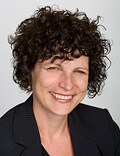Palliative care doctor Katherine Morrison, MD, remembers when she was asked to talk to a group of internal medicine residents who had been dealing with some "difficult things" on their rotation. But getting the group to talk about how they were feeling was "like trying to pull teeth," she said. No one wanted to speak up.

Katherine Morrison
Morrison, from the University of Colorado School of Medicine, thought about what it had been like when she was in med school. "Nobody would say anything, especially if it was going to make them look weak or vulnerable," she told Medscape Medical News.
"The bottom line is that for most physicians and other healthcare providers, it just doesn't feel safe to talk about your feelings, unless you are venting about how bad the system is," she added.
So Morrison and the rest of her palliative care team — which included chaplains, nurses, social workers, nurse practitioners, and physician assistants — decided to create a more structured format that would allow healthcare providers to speak in a nonthreatening environment. They came up with Good Grief Rounds, an hour-long program that uses storytelling "to debrief emotionally difficult cases in healthcare."
The team starts by picking a storyteller — usually an experienced clinician who will tell a story and share their vulnerability — and then finds a reading, often a poem, that complements the theme of the story. The reading and story are presented to a group of providers who break into smaller groups where each person can, if they want, share their own stories. The larger group then comes back together for a discussion and a mindfulness exercise.
"What we found was that people are very hungry to tell their own stories," said Morrison. They often preface their recounting with, "I've never told anyone this before."
One physician described being asked by the grandparents of a 5-year-old girl to tell her that her mother was dying because they couldn't bear to do it themselves. A resident shared the frustration he felt when an attending physician wasn't listening to a patient who was expressing the desire to die. And another physician talked about guilt over a mistake that would have a lifelong effect on a patient.
The format has been a success, Morrison said at the American Conference on Physician Health (ACPH) 2019 in Charlotte, North Carolina, where she presented highlights from evaluations completed by participants who attended one or more of 15 Good Grief Rounds from 2015 to 2017.
Of the 95 people who completed an evaluation, 98% found the content of the storytelling sessions useful, and 48% of those who had attended more than one session strongly agreed that the Good Grief Rounds increased their sense of community. The majority of participants (88%) reported an increased sense of mindfulness, and 35% of those who attended more than one session agreed that it helped them explore meaning in their work.
A sense of community, meaning, and mindfulness are all factors that have been shown to decrease burnout, said Morrison.
The real sign of success, however, is that word of Good Grief Rounds spread around her hospital, and her team has been asked to hold sessions or teach others how to do it, she told Medscape Medical News.

Mary Wierusz
Morrison is not the only one using storytelling and reading to help healthcare providers have difficult conversations. Mary Wierusz, MD, from Kaiser Permanente in Seattle, turned a personal interest in writing and reading into a pilot project on literature and medicine.
Literature and Medicine
"I was writing a lot before I went into medicine, but I let that part of me fall away," she told Medscape Medical News. "I wasn't reading and I wasn't writing like I used to."
But after a series of fortuitous meetings, Wierusz heard about Suzanne Koven, MD, who had been running a program — Literature and Medicine: Humanities at the Heart of Healthcare — at the Massachusetts General Hospital for more than a decade. Koven agreed to be an advisor on Wierusz's pilot project.
The ongoing pilot involves a 2-hour session once a month, held after normal work hours. Dinner is provided, and participants engage in a discussion of selected readings, which often include a mix of poems, essays, and short stories.
Themes of the sessions have included "physician as patient" and "caring for a sick child," Wierusz explained. The reading list for a recent session — "when things go wrong" — included Merced by Danielle Ofri, Thanksgiving in Mongolia by Ariel Levy, and a poem by Raymond Carver, What the Doctor Said.
"People come for all sorts of reasons," said Wierusz. Some are mid-career and are looking for ways to find new meaning in their work; others love to read and think it will be a good way to connect with colleagues.
Connecting with others has proven to be one of the big benefits of the project. Participant responses to the sessions, presented at the ACPH, included comments such as: "Discussion of topics provided a means of people sharing their own personal life stories, including the happy times and stressors, nurturing collegiality and a sense that you're not alone."
"We get into silos when practicing medicine," said Wierusz. "But doctors are human. We need to learn to ask for help when we need it, and the literature in medicine program helps us do that."
Taking the Time

Suzanne Koven
"Healthcare has become more and more frenzied and rushed. There is no time to talk about this meaningful work that we do," said Koven, who is currently the inaugural writer-in-residence at Massachusetts General Hospital and codirector of the new Media and Medicine program at Harvard University.
Given this lack of time, one would think it would take some convincing to get healthcare providers to read a poem or a story and then sit down with colleagues to discuss it, but this is not what Koven has found.
"I am not convincing anyone to do anything," she told Medscape Medical News. "The problem we have right now is that we have too many people who want to participate."
"We provide dinner, but it's not gourmet," she said. "It's the experience itself that is tremendously nourishing."

Colleen Farrell
Colleen Farrell, MD, a resident physician at Bellevue Hospital and NYU Langone in New York City, decided to tackle the problem in a different way. In January, Farrell launched a twitter feed — @MedHumChat — that brings "poetry, literature & art to the healthcare conversation."
Like the programs of Wierusz and Koven, MedHumChat starts with thematic readings that touch on different aspects of medicine. But discussions take place once a month as a live twitter chat (#MedHumChat), so people from all over can participate.
"We've had a surgeon on call participate and a med student on public transit in New Jersey who checked in on her way home," Farrell told Medscape Medical News.
And like her counterparts, Farrell believes that the discussions are incredibly helpful for all participants. "People really appreciate getting to talk to people outside their field," she said. "Medicine separates us all so much, yet we have so much in common."
For some, the readings and discussions provide new ways to understand patients. After the latest chat on the theme of the hospital — which featured The Ship Pounding by Donald Hall and Things My Daughter Lost in Hospitals by Toni L. Wilkes — Stefanie Reiff, MD, a fulltime hospitalist at NYU Langone, tweeted:
Farrell is quick to say that medical humanities is not the solution for everything. "If you have been awake for 28 hours and you have been asked to do more than is humanly possible, poetry can't fix that," she pointed out.
"We have a broken healthcare system and insurance system and there are real systems problems," she added. "But as people working in a broken system and doing our best to provide care for our patients, art and writing are really valuable."
Farrell is not alone in pointing out the limits of medical humanities.
"People think there is one thing that is going to fix everything. I think it's going to take 100 different things," said Morrison.
"There are a lot of different ways of using storytelling and humanities," Wierusz explained. "But it feels like clearly there is a need, both for the benefit of patients and of healthcare providers."
In a recent letter to the editor of Academic Medicine, Anna Reisman, MD, director of the program for humanities in medicine at the Yale School of Medicine, and third-year Yale medical student Zoe Adams advocate for what they call "a critical medical humanities."
"Since the 1970s, many medical humanities scholars have elevated empathy, enrichment, and observation as key concepts in justifying the field's existence" they write. But "a critical medical humanities moves beyond empathy and wellness to prioritize the intersection between humanities scholarship and social justice."
For Reisman and Adams, it "reinforces the idea that the study and practice of medicine are inherently political, and catalyzes deeper and actionable change."
Follow Medscape on Facebook, Twitter, Instagram, and YouTube
Medscape Medical News © 2019
Cite this: Sharing Stories Connects Clinicians to Each Other, Patients - Medscape - Oct 24, 2019.








Comments